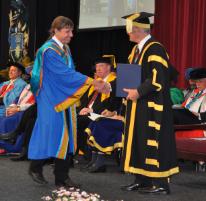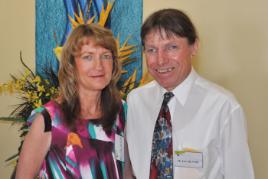Zen and the art of maintaining recovery after motorcycle accident
Published on 05 October, 2011
When Ian McNeilly walked across his graduation stage to accept a PhD recently, he marked a milestone that would have seemed particularly remote 30 years ago when he was in a hospital bed partially paralysed down one side, and beginning his prolonged recovery from a serious motorbike accident.
Reflecting on his journey since the accident, Ian believes a focus on study and self-development, avoiding the distraction of physical limitations, has been a key to his gradual recovery.

Dr Ian McNeilly crosses the stage during graduation recently
He's forever grateful to the friend who lured him out of hospital for a few drinks at a nearby Brisbane pub, and then convinced him to recover with friends in the country, instead of continuing standard hospital rehabilitation.
"The mind is a powerful tool," Ian says. "When I was in a hospital environment it was difficult to get out of that mindset as you are nursed and nurtured by caring people, but the focus is on you as an invalid or patient."
"When I got out of that environment I was no different to anyone else in my own mind and that helped me get back to physical health."
The next phase of Ian's journey was securing a job as a scientific assistant at a Warwick high school. It was there that he came across a university brochure and enrolled to study chemistry externally.
Juggling work and external study proved challenging, and Ian's wife Cathy convinced him to move to Rockhampton so that he could complete his degree on campus.

Ian and wife Cathy celebrate his PhD
On graduating Ian secured a job at the QAL alumina refinery in Gladstone and was able to apply his chemistry skills in their control and research laboratories for a period of 11 years.
His experience at QAL helped formulate his PhD research project which aimed at finding a better way for scientists to emulate and study the process of industrial pipe corrosion. Ian's project developed and studied a unique rotating parallel disc device (PDD). The PDD had been designed by Dr Alex Deev, and others at the CQUniversity Process Engineering and Light Metals (PELM) research centre in Gladstone, in order to facilitate the investigation of corrosion processes in high liquid flow rate environments.

